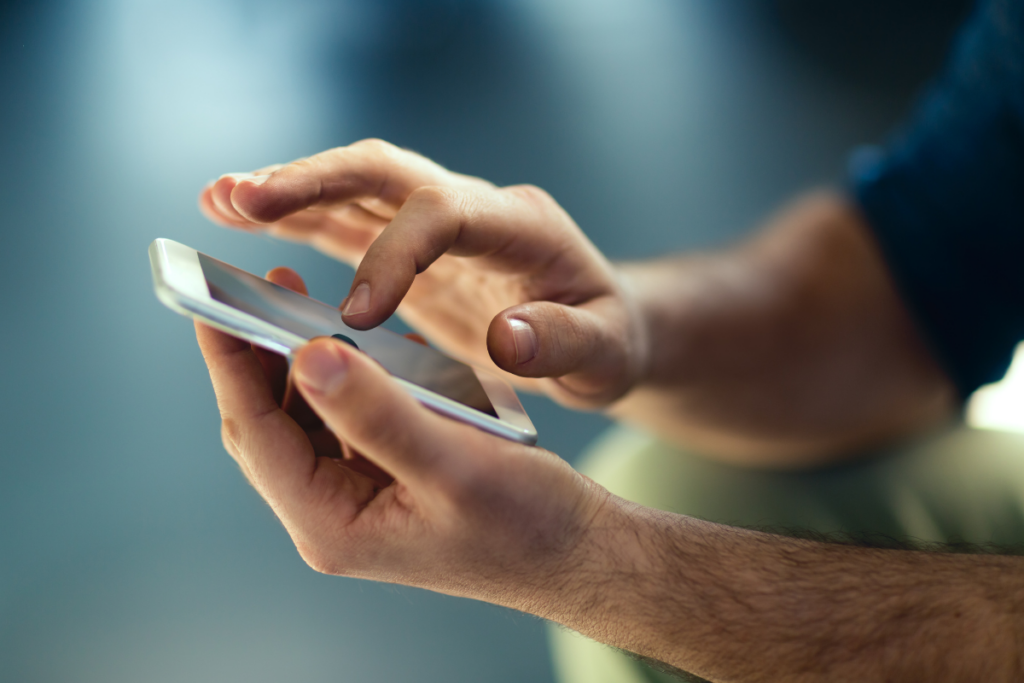
By: Brian Warner
It felt too late to be working. Surely everyone else in the office had left hours ago, right? “Just a few more things to cross off your to-do list and you can finally go home,” I kept telling myself. “Am I a workaholic? Do I need to start setting better boundaries?” I was barely dragging myself to the finish line.
It was 3PM.
It wasn’t too late to be working, and no one had left hours ago. But I’d given up cell phone use and all that comes with it that week, so by mid-afternoon it certainly felt that way. Don’t judge me.
Not even GPS or email or weather forecasts, just answering phone calls when people needed me at work (because for as committed as I was to this, I’m also committed to keeping my job).
We hear a lot about how harmful smartphones are for our mental health. Approximately thirteen billion think pieces have been written railing against phones and their role in the downfall of civilization – and the worst part? They’re not totally off base (well, at least about the mental health part). Studies have shown a clear, significant relationship between higher cell phone use, stress, and anxiety. And when people are already struggling with issues like depression, OCD, ADHD, sleep problems, and addiction, smartphone overuse can make them worse.
So a week off should do wonders for anyone, right? . . . right?
By 3PM the effects weren’t hitting me. Maybe I was having a digital “withdrawal,” but if you’ve ever gone to work with a nasty cold it probably felt pretty similar to how I was feeling. The best word I can think of to describe it is “sluggish.” Everything from my mood to productivity to feelings of loneliness was taking a hit. And probably, that’s no coincidence.
We’re not just machines, we need stimulation over the eight hours we’re in the office! And one of the best, easiest ways to do that at work comes from your phone: music. When your brain recognizes a tune, neurons immediately start firing off and neurochemicals like dopamine and opiates (which boost mood, motivation, and attention) are released. Workers even score higher on job satisfaction and performance when they’re listening to music in the office.
“Music might even serve as a way not just to make you more productive, but to also ease some of the unpleasant emotions that can happen while you’re doing routine tasks,” Manuel Gonzalez, a psychologist at Seton Hall University, says.
The “best” music to listen to generally has to do with personal preference (music you don’t like probably won’t trigger much dopamine) but Beloit College music professor Daniel Barolsky is quick to point out the difference between music that boosts productivity because you like it and music that becomes a distraction because you like it a bit too much. He believes two genres are best for productivity: classical music and the sounds of nature, mainly because “there are no words, and this lowers the potential for distraction.”
He also singles out movie/video game soundtracks and, believe it or not, funk music.
And then there’s me. Looking remarkably like Grumpy Cat as I sit in my silent office. And I love funk music.
It’s totally fair to say that this is a distraction. Especially when you make the jump from listening to music to listening to podcasts, the idea that an entire conversation happening in the background could possibly be pulling someone’s focus from being in the moment makes sense – which is tough for me, since at least half of my sentences start with “I heard in a podcast —”
But outside of work, when I’d take a walk on my lunch break or drive home, I started wanting that distraction more and more. Without it, I did what we all tend to do, in the car after work or in bed at night or alone in the shower: replay old arguments in my head and obsess over every insult I’ve gotten in the past twenty years.
When you do this, it’s called rumination, or “repetitive thinking or dwelling on negative feelings and distress and their causes and consequences.”
Sometimes when I go for a walk I don’t want to obsess about a mean thing someone said to me when I was ten. Sometimes I just want to obsess over a murder I’d literally never heard about before in the form of a six-part podcast series.
Rumination can actually sometimes be helpful. Research shows that, when you’re focused on goal attainment and correcting errors you’ve made before, ruminating on old experiences can help people learn and grow from those experiences. But more commonly, ruminating on old memories can “contribute to the development of depression or anxiety and can worsen existing conditions” like OCD and bipolar disorder.
“All of us ruminate. It’s a matter of how long we do it for, and what skills we have to stop when we want to,” says Oregon State University psychology professor Hannah Lawrence. “When we get stuck thinking about negative things that happened in the past, that makes us feel even worse, and it leads to more difficulties regulating our emotions and regulating our bodies.”
Luckily, there are plenty of ways to manage rumination and let go of repetitive thoughts, like meditation, exercise, watching a movie, talking to a friend, or reading a book.
Which brings us to . . . the part I didn’t want to talk about. It’s too shameful. That maybe . . . possibly . . . there is a chance . . . there were some upsides to not using my phone (I’m so upset to be writing that).
Because like reading to manage spiraling dark thoughts, I have to admit that when I switched from scrolling through Instagram to reading a book before bed my sleep did improve. Like, IMPROVE. I’d fall asleep without any problem and wake up ready to take on the day.
Terrible, I know.
This is the kind of advice we see all the time. Get off your phone thirty minutes before you go to bed; don’t sleep with your phone in the same room as you; use blue-light glasses when you’re using electronics. Easier said than done when all you want to do is a little mindless swiping after a stressful day. But it’s an important step toward helping us feel rested the next morning.
“The light from our screens can delay our transition to sleep, even if we are engaged in some soothing activity online,” says Joanna Cooper, M.D., a neurologist with the Sutter East Bay Medical Foundation. “The timing of sleep and wakefulness is controlled by two areas in the brain. One is highly sensitive to light and drives wakefulness, while the other, called the pineal gland, secretes the sleep hormone melatonin when the light dims in the evening.”
Even staying off your phone early in the morning has been shown to be the better route. “The information overload that hits [you] before you’re fully awake . . . interferes with your ability to prioritize tasks” throughout the rest of the day, says Dr. Nikole Benders-Hadi, a psychiatrist at Doctor On Demand.
So then why, now that I’m back to using my phone again, does that still feel like such hard advice?
Every argument against cell phones inevitably comes around to the loneliness problem. More adults than not are saying that they feel lonely. And this only got worse during the pandemic – so maybe it’s no coincidence that daily screentime nearly doubled for most people at the same time.
One problem?
Loneliness rates didn’t start to increase when smartphones entered the scene. They’ve been increasing since – believe it or not – the 1970s.
It’s easy to say, “put the phone down and talk.” But as long as people have distractions to keep them from meaningful connections, we’re not fighting loneliness, we’re just finding phone-free ways to experience it.
The question of whether or not to have cell phones is like the question of whether or not to have pandas; it doesn’t really matter what you think, they’re here either way. Maybe we shouldn’t be digitally connected at all times, but that doesn’t change the fact that that’s a necessity of daily life for most people, like parents of small kids and overworked employees.
Research shows that we don’t need to give up our smartphones entirely to take care of our mental health. Instead, we can use them more intentionally. Jennifer Katzenstein, Ph.D., a Johns Hopkins researcher looking at the effects of limiting screentime, says, “[A] reduction of smartphone use by one hour per day for one week [can result in] long-term reduced smartphone use, as well as reduced depression and anxiety, and improved physical activity and life satisfaction.”
“A small change in our behavior can result in a big impact to our overall mental health and how positively we feel about our lives,” says Dr. Katzenstein, “as well as the health behaviors we engage in.”
DISCLAIMER
The information, including but not limited to, text, graphics, images and other material contained on this website are for informational purposes only. No material on this site is intended to be a substitute for professional medical advice, diagnosis, or treatment. Always seek the advice of your physician or other qualified healthcare provider with any questions you may have regarding a medical condition or treatment and before undertaking a new health care regimen, and never disregard professional medical advice or delay in seeking it because of something you have read on this website.
